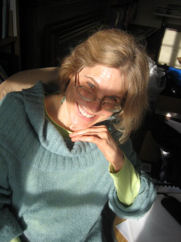The weather forecast for the UK was great: sunshine Friday, Saturday, Sunday and Monday.
I got into Heathrow around noon on Friday and my ex husband was there to meet me (he didn’t do that when we were married, but now he is very nice. I don’t understand this, but I like it).
I’m a dual national, though it took me more than two decades to take that step: I was pretty stubborn about becoming a “subject” (must have been all those grade school years of American history including chanting Taxation Without Representation is Tyranny); but I actually broke down and curtseyed to the queen. I mean in person, really, while I took her gloved hand and said, How do you do Ma’am — which, just so you know, is exactly what you are meant to say when you are introduced to Her Majesty, before you move smartly on, because she does not care, even a tiny a bit, how you do). After that I figured (Brits would say reckoned) I had already compromised any republican (with a small r) principles so I might as well go ahead and get the piece of paper – my process through citizenship is another story.
Nevertheless, it surprised me, once I had done it, how different I felt, even after 25 years. I used to come home and resent the interrogation of the immigration officials. Sometimes I wanted to say, I’ve lived here longer than you have. Now I only say good morning and hand over the passport.
I’m thinking, you might be stupid enough to mess with Her Majesty (though I don’t advise it). But Her Britannic Majesty? I thought not.
This time, getting home after five months, was a little traumatic. I am having some cognitive dissonance with my housesitter, as in he says he washed the sheets and made the beds and I found crumpled, clearly slept in beds in two of the four bedrooms. Sorry, I didn’t think of taking a picture before I ripped the sheets off and took them to the laundry room only to find that no detergent was left. That was either before or after I sat down to pee and found (too late) that there was no toilet paper either.
However, I did take a picture of my back rock garden before I left in mid April.

And I took a picture on Friday when I returned.
When my housesitter called (I didn’t call him; I thought it would be good to cool off first and get over some of my jet lag, but, unwisely, he poked tired-damp-from-no-toilet-paper me).
I said (among other things) what is that enormous pile of sticks in my garden? (Actually I could see what that enormous pile of sticks was – it was the chopped down remains of a more than 100 year old rose bush.) The pile was several feet high and took up most of the garden.
He said he hadn’t noticed any sticks and knew nothing about it. Like I said, cognitive dissonance. I didn’t ask whether he’d noticed the substantial mole activity either, or that the local cats had moved in and there were hundreds of faeces under the pine tree. Anyway, gardening wasn’t his job, just looking after things.
(If you are a potential buyer reading this blog, Hedges is a charming, part 18th century, village property, once a Draper’s Shop, with many original features, sensitively modernised, and a well appointed rock garden to the rear. Without moles, cat shit or thorny sticks, no siree.)
I crawled exhausted into bed Friday night and woke up Saturday morning to a thick fog, in my head and in the air outside. From about September to May when there is no cloud, which it isn’t all that often, you are especially unlikely to see any sun. (That particular irony ought to have its own name, but if it does I don’t know it.) The weather forecaster patiently explains that all that “sunshine” — it’s in inverted commas (quotes), because hey, as far as I am concerned, it’s a rumour — means a discrepancy between the temperature of the ground and the air, and, well, that brings fog. Fundamentally it’s sunny (so comforting to know), but the fog might or might not “burn off”. Implicit shrugs to indicate unpredictability, and to suggest the weather forecaster doesn’t care. She doesn’t get paid more if the sun shines. Finally the weather forecaster adds that in the fog it will “feel chilly” but in the sunshine would probably “feel pleasantly warm”.
It was a bit like the first time I supported the UK in the Davis or Ryder Cups and realised I was at least as much Brit as Yank. A long time ago I got really angry about weather forecasts like this (not the weather, the forecast). I used to think, Goddamnit I’m in charge of how I feel. Just tell me what the temperature is, willya?
This weekend, that BBC radio voice seemed simply reassuring. I looked out the window at the fog, snuggled back down into the (washed in water only, but hey, if it’s enough to take away sins I’m sure it takes away cooties) sheets, and thought, Right it’s going to feel chilly until that fog burns off and then everything’s going to feel just fine and warm.
After that, there’s a big pile of thorny sticks to get rid of.








